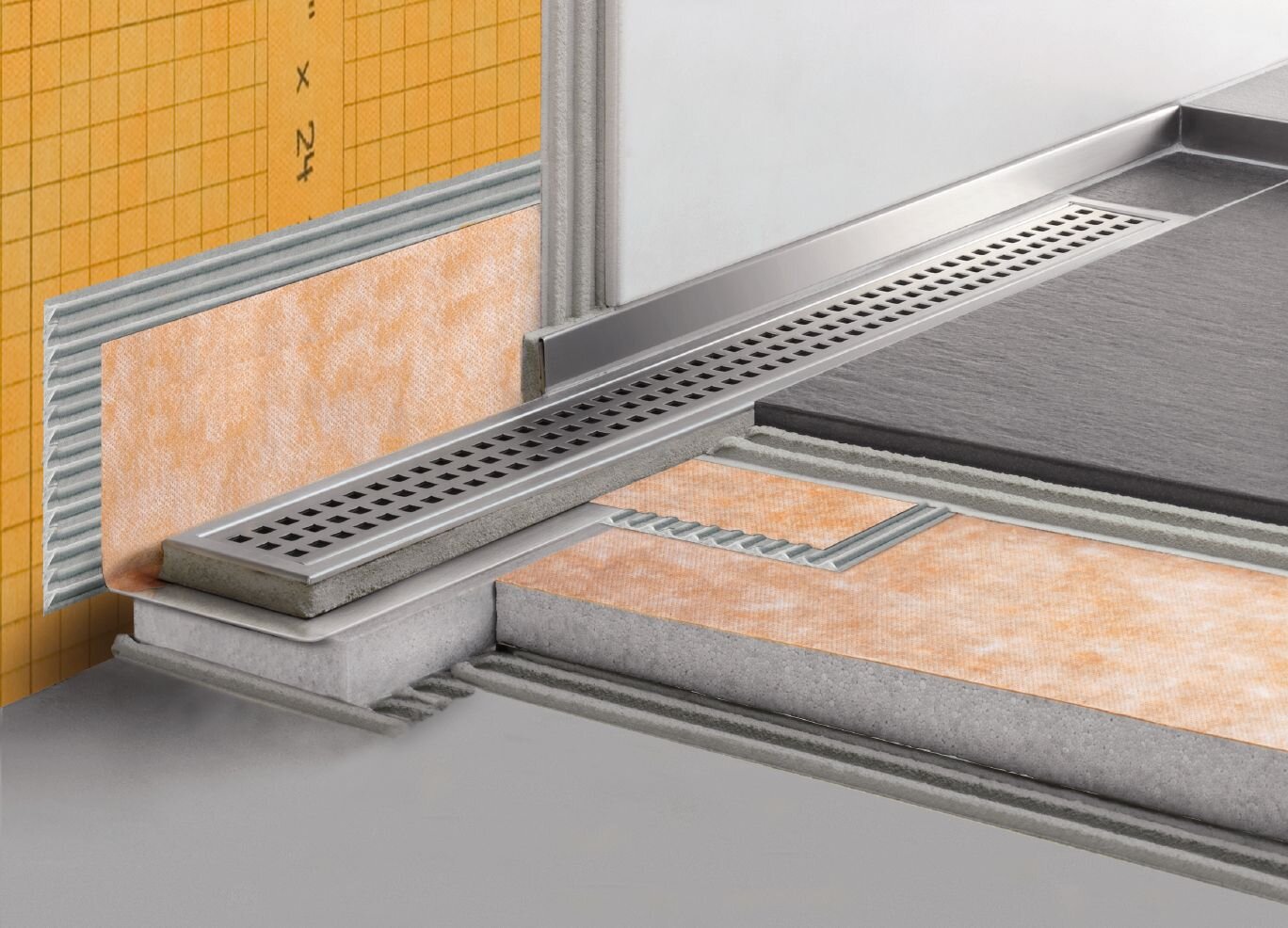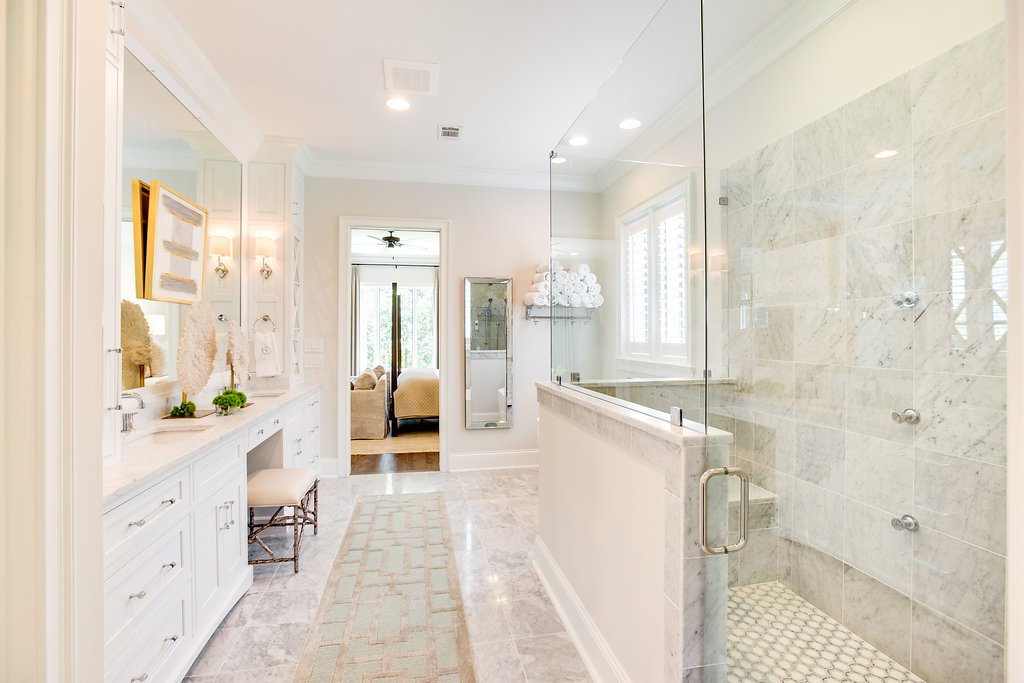Should You Install A Linear Shower Drain?
Planning a bathroom remodel in Tuscaloosa or Birmingham, Alabama, is exciting but full of decisions. You’ll likely start by picking out tiles, choosing countertop materials, selecting cabinet finishes, and more—all while trying to balance how things look with how they work.
Sometimes, your choices will depend on what you want from the space in the long term. For example, if you’re considering aging in place, you might want to swap out the tub in your master bath for a threshold-free shower. You might not usually give much thought to what kind of drain you’ll use, but if you’re going with a "wet room" or a threshold-free shower, it’s definitely something to consider.
You could also opt for a linear shower drain instead of the standard circular or square drain. This unique choice enhances the functionality of your shower and gives it a sleek, modern look.
Key Takeaways
Here are key takeaways from our blog post on linear shower drains and why you should include one when renovating a bathroom in your West Central Alabama home.
A linear shower drain can be installed along the shower's edge or flush against the wall.
A linear shower drain requires only a single-direction pitch, giving you far more design flexibility.
Linear shower drains come in various lengths and offer flexibility to customize your shower.
Photo Credit:
Schluter®-KERDI-LINE Linear Drain
Is a Linear Drain Right For Your Bathroom Renovation?
Unlike a traditional round or square drain, a linear shower drain features a slightly larger rectangular shape. Our bathroom designers at Toulmin Kitchen and Bath in Tuscaloosa favor linear shower drains because they offer flexibility in placement and can lie along the shower's edge or flush against the wall. However, like any other type of drain, the floor must slant toward the drain to ensure proper water flow out of the shower.
The location of the drain will depend on the location of the waste line, which you may already have determined or installed based on your project. In some cases, relocating the waste line may be an option, depending on the specific site conditions.
Installing a linear drain differs from the traditional center drain, offering specific advantages. Unlike a center drain, which requires the floor to slope in four directions, a linear drain only needs the floor to pitch in one direction, giving you greater flexibility in your shower design.
Why Linear Shower Drains Are a Game-Changer
Traditional circular shower drains can limit your tile options for the shower pan due to their placement and the need for a 4-sided pitch. Typically, this restricts you to using smaller tiles, usually no larger than 2" x 2".
In contrast, a linear shower drain requires only a single-direction pitch, allowing you to use larger tiles and giving you far more design flexibility. With a linear drain, the shower floor usually slopes toward a wall, enabling the use of large-format tiles in your design.
This means that a linear shower drain isn't just a functional component—it also enhances the overall aesthetics of your shower area and bathroom space. The drain is less noticeable since it’s often placed near a wall. Linear shower drains are particularly effective in threshold-free, curbless showers, which lack a ledge to contain water. A linear drain covers a larger surface area, ensuring better water drainage.
The Benefits of a Linear Shower Drain
Allows for the use of larger tiles, offering more design flexibility.
Enhances aesthetic appeal by being less noticeable, especially when placed near a wall.
Ideal for threshold-free, curbless showers, providing improved water drainage over a larger surface area.
Reduces tile limitations, allowing for more creative and modern shower designs.
Customizing Your Shower: The Versatility of Linear Drain Installation
Unlike standard round or square drains, linear shower drains offer various options that make them versatile for any bathroom remodel. They come with flexibility in placement, size, and installation, making linear shower drains a practical and stylish choice for creating a custom, modern bathroom.
Linear Drains Provide Design Flexibility
These drains can be installed in different locations within the shower, giving you flexibility in your design. For example, a linear drain can be placed along the edge of the shower, flush against the wall, or even in the center, depending on your layout and aesthetic preferences.
A Linear Drain Can Be Customized For Your Shower
These drains come in a range of lengths, allowing you to choose one that best suits the dimensions of your shower. Whether you want a subtle, shorter drain or a longer one that spans the width of your shower, you can select the size that fits your design.
Top Installation Options for Linear Shower Drains
There are various installation methods to consider for linear shower drains. Linear drains can be installed in a "channel" style, where the drain is recessed into the floor, or in a "surface" style, where the drain is level with the shower floor. Each installation type has its benefits, with the channel style offering a more seamless, integrated look, while the surface style can be easier to install in some cases.
Here are the top installation types for linear shower drains:
Wall-to-Wall Installation: The drain spans the entire length of one wall, offering seamless drainage across the shower floor.
Against a Wall Installation: The drain is positioned flush against a single wall, creating a clean, minimalist look with efficient water flow.
Channel Style Installation: The drain is recessed into the shower floor, blending seamlessly with the tiles for a sleek, integrated appearance.
Threshold Installation: The drain is placed at the shower's entrance to prevent water from spilling into the bathroom, ideal for curbless showers.
Curbless Installation: The drain is used in a shower without a curb, providing an open, accessible design while ensuring proper water drainage.
Center Placement Installation: The drain is installed in the center of the shower, offering a more traditional but still modern alternative to round or square drains.
Creating A Seamless, Accessible Shower for Your Alabama Home
Installing a shower drain without a curb, barrier, or threshold is a popular choice for those seeking a sleek, modern look that offers easy access to the wet area. This design enhances the bathroom's aesthetic appeal and improves functionality, particularly in homes where accessibility is a priority.
For the perfect curbless shower, it’s essential to ensure that the floor heights between the shower area (wet area), the surrounding bathroom (dry area), and the adjoining room are all level. This uniformity in floor height creates a smooth, continuous transition that eliminates tripping hazards and enhances the overall visual flow of the space.
However, achieving this seamless look requires careful planning. The specific conditions of your bathroom, such as the subfloor structure, the slope necessary for proper drainage, and the type of tiles used, will determine the steps required for installation. In some cases, adjustments to the subfloor may be needed to accommodate the sloping necessary for efficient water drainage without compromising the level transition between spaces.
Ultimately, a curbless shower installation provides a barrier-free entry and adds a touch of contemporary elegance to your bathroom, making it an excellent choice for modern homes.
What is the Cost of a Linear Shower Drain?
While you can find a basic circular shower drain at your local home improvement store starting around $15, linear shower drains, especially wall-to-wall models, tend to be more expensive. This is because these drains are often custom-made, and custom work typically comes with a higher price tag. Generally, a linear shower drain will cost significantly more than traditional circular or square options, and you should also plan for slightly higher labor and installation costs.
Installing a linear shower drain requires careful coordination between your plumber, contractor, and tile installer to ensure everything is aligned properly. Despite the higher costs, a linear shower drain is a worthwhile investment if you’re aiming for a modern aesthetic, planning for aging in place, or designing a wet room. The sleek design and enhanced functionality make it a smart choice for a stylish and practical bathroom remodel.
Let’s Transform Your Bathroom!
If you’re inspired by the possibilities that a linear shower drain can bring to your bathroom, now is the perfect time to start planning your dream space. Toulmin Kitchen & Bath specializes in creating beautifully designed and expertly crafted bathrooms in the Greater Tuscaloosa and Birmingham areas.
Whether you’re looking for a modern upgrade, a more accessible design, or a complete renovation, our team is here to bring your vision to life. Get started by booking your design appointment with Toulmin Kitchen & Bath today!








